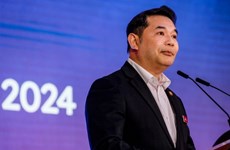ASEAN, China hold 20th SOM on strategic partnership
Senior officials from ASEAN and China gathered in the Thai seaside
resort of Pattaya on April 21-22 to review the two sides’ partnership
and the implementation of the Declaration of the Conduct of Parties in
the East Sea (DOC).
Senior officials from ASEAN and China gathered in the Thai seaside
resort of Pattaya on April 21-22 to review the two sides’ partnership
and the implementation of the Declaration of the Conduct of Parties in
the East Sea (DOC).
They were also present for an official consultation on a potential Code of Conduct in the East Sea (COC).
Deputy Foreign Minister Pham Quang Vinh led a Vietnamese delegation to these events.
At the 20th Senior Officials Meeting (SOM) on the ASEAN-China Partnership, the two sides reviewed their cooperation and the implementation of the outcomes of the 16 th ASEAN-China Summit last October and the 2011-2015 ASEAN-China Action Plan.
They agreed that the ASEAN-China strategic partnership continued to see important progress in various areas such as economics, politics-security, culture and education.
ASEAN countries congratulated China for its all-round achievements while China pledged strong support for ASEAN in building its community and promoting its central role in cooperation for peace, security and development in the region.
The two sides highly valued the celebration of 10 years of ASEAN-China strategic partnership in 2013, with the organisation of a special foreign ministers’ meeting, a summit marking the event and an ASEAN economic ministers’ programme to promote economic cooperation in China.
Two-way trade between ASEAN and China now surpasses 400 billion USD. China remains the largest trade partner of ASEAN and the bloc is the third largest trade partner of the former.
The two sides strive to bring their two-way trade to 500 billion by 2015.
ASEAN and China affirmed their determination to further step up their strategic partnership at the meetings.
The talks also acknowledged China’s recent proposals to enhance bilateral collaboration, including the building of a treaty on neighbourliness of amity, friendship and cooperation; the upgrading of the ASEAN-China Free Trade Agreement, the establishment of the Asian infrastructure investment bank; and the strengthening of marine cooperation.
The event was an active and effective preparation for the success of the annual ASEAN-China Foreign Ministers’ Meeting scheduled for this August.
At the seventh ASEAN-China Senior Officials’ Meeting (SOM) on the DOC implementation, the two sides stressed the significance of the full implementation of the DOC and efforts to accelerate the building of the COC in order to ensure peace, stability, security and marine safety in the East Sea.
ASEAN representatives said the full implementation of the DOC includes addressing disputes by peaceful measures, observing international law and the 1982 United Nations on the Law of the Sea (UNCLOS), materialising the 2014 Work Plan on the basis of the document guiding the implementation of the DOC, exchanging measures to speed up trust-building projects such as search and rescue, setting up an ASEAN-China hotline at sea, and humanitarian aid.
They agreed to make the best use of the outcomes reaped at the first consultation in Suzhou, China, in September, 2013.
ASEAN highlighted the need to early begin substantial negotiations on the COC, first of all to reach consensus on viewpoints, approaches and goals of the COC, saying the document should be a an overall set of rules with values higher than that of the DOC in a bid to better ensure peace, security and marine safety in the region.
The two sides also underlined the building of a concrete working plan and schedule to speed up the consultation process on the COC.
ASEAN suggested the early deployment of several measures to accelerate trust-building work, prevent and handle arising issues such as setting up the hotline and conducting joint rescue operation.
Delegates at the event affirmed the ASEAN-China SOM as the official mechanism in building the COC and the Joint Working Group as the support one that implements guidelines put forth at the meeting.
The senior officials will report results to the annual ASEAN-China Foreign Ministers’ Meeting in upcoming August. Another SOM and two meetings of the joint working group are scheduled to be held this year.
At the function, the Vietnamese delegation actively engaged in consultations and dialogues.
Speaking at the meetings, Deputy Minister Vinh highly valued the ASEAN-China strategic partnership as well as cooperative outcomes between the two sides over the past time.
Sharing other participants’ views, the official also laid emphasis on the significance of ensuring peace, stability, marine security and safety in the East Sea, promoting active and result-oriented consultations between the two sides, fully implementing the DOC, abiding by international law and the 1982 UNCLOS, and actively implementing trust-building measures.
He urged for the early formation of the COC with comprehensive binding rules completed with mechanisms and measures to better ensure peace, security and marine and aviation safety in the region.-VNA
They were also present for an official consultation on a potential Code of Conduct in the East Sea (COC).
Deputy Foreign Minister Pham Quang Vinh led a Vietnamese delegation to these events.
At the 20th Senior Officials Meeting (SOM) on the ASEAN-China Partnership, the two sides reviewed their cooperation and the implementation of the outcomes of the 16 th ASEAN-China Summit last October and the 2011-2015 ASEAN-China Action Plan.
They agreed that the ASEAN-China strategic partnership continued to see important progress in various areas such as economics, politics-security, culture and education.
ASEAN countries congratulated China for its all-round achievements while China pledged strong support for ASEAN in building its community and promoting its central role in cooperation for peace, security and development in the region.
The two sides highly valued the celebration of 10 years of ASEAN-China strategic partnership in 2013, with the organisation of a special foreign ministers’ meeting, a summit marking the event and an ASEAN economic ministers’ programme to promote economic cooperation in China.
Two-way trade between ASEAN and China now surpasses 400 billion USD. China remains the largest trade partner of ASEAN and the bloc is the third largest trade partner of the former.
The two sides strive to bring their two-way trade to 500 billion by 2015.
ASEAN and China affirmed their determination to further step up their strategic partnership at the meetings.
The talks also acknowledged China’s recent proposals to enhance bilateral collaboration, including the building of a treaty on neighbourliness of amity, friendship and cooperation; the upgrading of the ASEAN-China Free Trade Agreement, the establishment of the Asian infrastructure investment bank; and the strengthening of marine cooperation.
The event was an active and effective preparation for the success of the annual ASEAN-China Foreign Ministers’ Meeting scheduled for this August.
At the seventh ASEAN-China Senior Officials’ Meeting (SOM) on the DOC implementation, the two sides stressed the significance of the full implementation of the DOC and efforts to accelerate the building of the COC in order to ensure peace, stability, security and marine safety in the East Sea.
ASEAN representatives said the full implementation of the DOC includes addressing disputes by peaceful measures, observing international law and the 1982 United Nations on the Law of the Sea (UNCLOS), materialising the 2014 Work Plan on the basis of the document guiding the implementation of the DOC, exchanging measures to speed up trust-building projects such as search and rescue, setting up an ASEAN-China hotline at sea, and humanitarian aid.
They agreed to make the best use of the outcomes reaped at the first consultation in Suzhou, China, in September, 2013.
ASEAN highlighted the need to early begin substantial negotiations on the COC, first of all to reach consensus on viewpoints, approaches and goals of the COC, saying the document should be a an overall set of rules with values higher than that of the DOC in a bid to better ensure peace, security and marine safety in the region.
The two sides also underlined the building of a concrete working plan and schedule to speed up the consultation process on the COC.
ASEAN suggested the early deployment of several measures to accelerate trust-building work, prevent and handle arising issues such as setting up the hotline and conducting joint rescue operation.
Delegates at the event affirmed the ASEAN-China SOM as the official mechanism in building the COC and the Joint Working Group as the support one that implements guidelines put forth at the meeting.
The senior officials will report results to the annual ASEAN-China Foreign Ministers’ Meeting in upcoming August. Another SOM and two meetings of the joint working group are scheduled to be held this year.
At the function, the Vietnamese delegation actively engaged in consultations and dialogues.
Speaking at the meetings, Deputy Minister Vinh highly valued the ASEAN-China strategic partnership as well as cooperative outcomes between the two sides over the past time.
Sharing other participants’ views, the official also laid emphasis on the significance of ensuring peace, stability, marine security and safety in the East Sea, promoting active and result-oriented consultations between the two sides, fully implementing the DOC, abiding by international law and the 1982 UNCLOS, and actively implementing trust-building measures.
He urged for the early formation of the COC with comprehensive binding rules completed with mechanisms and measures to better ensure peace, security and marine and aviation safety in the region.-VNA











